|
By Kathleen Kocks
When the threads of deceit unraveled at Enron in 2001, people were shocked. Then we discovered Enron was not alone. As problems also surfaced at Tyco, WorldCom, and other companies, people became angry and afraid.
Stock market values plunged as jittery investors began to wonder if the unprecedented economic boom of the 1990s had been nothing but a disguised bust. The economic earthquake soon rumbled to every nook of the U.S. executive, legislative, and judicial branches.
From these scandals came a strong slap on the hand—or more to the point, handcuff on the wrist: the Sarbanes-Oxley Act of 2002. No longer can company officers shift blame for sloppy bookkeeping or outright swindling onto others. No longer can they claim they didn’t know what was happening. If wrongdoing is discovered, company officers go to prison, too.
The Securities and Exchange Commission also weighed in, with new reforms. Sarbanes-Oxley and these reforms are changing the way U.S. public companies do business. Companies must meet strict requirements for internal control of procedures and financial reporting and for external disclosures. Strong corporate governance and business ethics have regained their prominence.
How has the world changed for a corporation’s general counsel? As the top legal adviser, the GC is like a good shepherd, tending to the company’s welfare, keeping it from straying, and steering it to best accomplish its goals. Many believe that Sarbanes-Oxley has not dramatically changed that guardianship role.
“Sarbanes-Oxley doesn’t add enormously to the laws that exist, although it does add some new wrinkles,” says Professor Lawrence Mitchell, who teaches ethics and accountability at GW Law School. “The GC has to be much more careful about the quality of the corporation’s disclosure and internal codes of ethics, and about making certain there are chains of communication so that the CEO knows about any wrongdoing. This is something that a good GC would have done anyway. There hasn’t been a lot that Enron has done to change what good practice is; we knew what good practice was before Enron.”
Echoing Mitchell’s assessment is Professor Theresa Gabaldon, who teaches corporations, securities regulation, and professional responsibility. “All lawyers dealing with corporate clients have become sensitized to the issue of corporate corruption. There has been quite a hullabaloo over the passage of Securities and Exchange Commission rules in response to the demands of Sarbanes-Oxley,” she says. “These rules require reporting serious defalcations up the corporate ladder, but I personally believe that they require little more than what competent, dedicated lawyering has called for all along, from GCs as well as outside counsel.”
For feedback from the front, we spoke with five GW Law alumni who have achieved prominence as lead GCs at Fortune 250 companies.
Richard Blackburn, JD ’67
Duke Energy Corp.
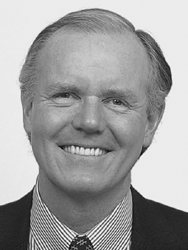 Ask Richard “Dick” Blackburn whether it is different working in a post-Enron/Sarbanes-Oxley world, and words flow. Ask Richard “Dick” Blackburn whether it is different working in a post-Enron/Sarbanes-Oxley world, and words flow.
“The answer is absolutely yes,” he states. “Whether you are talking about post-Enron, Tyco, Adelphia, WorldCom—pick your company—in a post-business-scandal environment, it is very different. The bright light shining on financial reports is more intense; the amount of financial data to be filed is greater; focus on the data is more intense. There has been a substantial change in the way businesses operate because of the crisis coming out of the bubble of the ’90s.”
Newly retired from his job as executive vice president, chief administrative officer, and general counsel at Duke Energy Corp., Blackburn has substantial legal and business experience, and strong convictions about corporate governance and ethics.
Blackburn’s legal career began at several East Coast telephone companies, then he landed in 1976 at New England Telephone, where he eventually became vice president and GC. In 1991, when the company evolved into NYNEX, Blackburn shifted his focus and became the president and group executive of NYNEX Worldwide Communications and Media Group.
He led the group’s activities in several unregulated telecommunication areas: long distance, video, cellular, and wireless. “It was very entrepreneurial, with joint ventures in Europe and Asia. Really a lot of fun,” Blackburn adds.
In 1997, as NYNEX merged with Bell Atlantic, a search firm contacted Blackburn to become the GC for Duke Energy, which had just merged with Pan Energy. Electricity markets were being deregulated, opening new opportunities and spawning company growth. Blackburn had what Duke wanted: a legal background and a significant business career. The job put Blackburn’s skills to a royal test.
“I had several challenges at Duke. The first was taking a company that had most of its 100-year history as a regulated utility, then equipping it as a growth company that was buying other assets in unregulated markets,” Blackburn says.
“A second challenge was working for a large player in an industry that was under stress, in terms of marketplace performance, regulatory oversight, investigations and lawsuits. Managing that fast-changing environment was a major challenge.”
And then came the Enron debacle. “All the investigations got launched, and Duke Energy had its share. When you look at criminalization of corporate misbehavior, the GC ends up dealing with a number of investigations and sitting with a lot of white-collar crime specialists. I was shocked that I was spending any time on criminal law issues. Duke Energy avoided any indictments, but that’s not to say we weren’t looked at.”
A proponent of corporate governance, Blackburn is pragmatic about Sarbanes-Oxley and new SEC reforms.
“Was it necessary? Probably not, had businesses followed the law as it existed. But when you’ve had the kind of experience we’ve just had, a piece of legislation such as Sarbanes-Oxley is a very useful catalyst to get people back to the bull’s eye, better managing their affairs and working in shareholders’ interest and within the law,” he begins.
“There is a great deal of debate and whining in the corporate world about the burdens of Section 404, which requires that corporations attest they have looked at their control mechanisms and are satisfied they comply with the law and the regulations that govern the business. It also requires outside auditors to attest. But it is a very good thing to do, particularly when coming off the ’90s when companies grew so fast and didn’t keep up with their internal controls.”
“On the ethics issue, I’ve advocated seemingly forever that lawyers, particularly in corporations, have unique responsibilities. If they are doing their job well, they can see earlier than others when business people start to stray. It’s not that people are bad or evil, but when they are hard-charging and trying to get things done, they inevitably push the envelope a little—or a lot.
“Helping people correct their course at an early stage and avoid problems isn’t a nice or a good thing to do; it is required. Seize the opportunity early on to help people do the right thing in the first place.”
Blackburn also feels GCs are most effective if they are deeply engaged in a company’s day-to-day management and, if possible, have operational experience. “But it is absolutely vital that they be part of the inner circle and help the management shape the business to achieve the company’s commercial objectives, while also complying with the law and the fiduciary obligations to shareholders.”
Now retired, Blackburn plans to spend more time with his family and sports; training is under way for a triathlon this summer with his son and daughter-in-law. He is active with GW Law and chairs its Board of Advisors. He also wants to serve on boards of certain public companies and stay active in issues like corporate governance, diversity, and ethics. “I’ll forever look for ways to speak out on ethics issues.”
Sheila Kearney Davidson, JD ’86
New York Life Insurance Co.
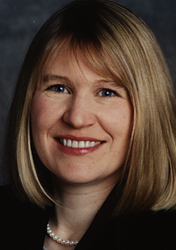 For Sheila Kearney Davidson, senior vice president and general counsel at New York Life Insurance Co., life in a post-Enron, Sarbanes-Oxley world isn’t very different. One reason is Davidson herself. For Sheila Kearney Davidson, senior vice president and general counsel at New York Life Insurance Co., life in a post-Enron, Sarbanes-Oxley world isn’t very different. One reason is Davidson herself.
Davidson started her career as an attorney at Shearson Lehman, then a year later became an enforcement officer at the National Association of Securities Dealers. By 1991, she had the regulatory expertise New York Life sought.
“When I came here, insurance companies were moving toward offering SEC-registered products. This was my area of expertise and, because no one had that expertise here, I quickly found a niche,” Davidson begins.
“Then around 1993, state insurance regulators began shifting their focus to sales-practice regulation that was more in tune with SEC regulation. I was tapped in 1994 to help design an overall compliance policy for the company and its 7,000 sales agents. Then in 1997, I was asked to run the compliance department. This all raised my visibility and in 2000 I became GC.
“I’ve never worked for a law firm, which is rather interesting considering what I do today,” muses Davidson. “I have an incredibly interesting job that touches every aspect of the company. I’m involved in high-profile litigation, supervising mergers and acquisitions, overseeing regulatory challenges, and handling a broad range of contracts.
“I oversee all the other nuts-and-bolts aspects of a company, like intellectual property, employment law issues, and management of an enterprise-wide 80-person legal team. I also sit on the executive management committee that establishes corporate policy, so I have a broad vista of what goes on in the company.”
As to why Sarbanes-Oxley has not greatly affected New York Life, Davidson refers to New York Life’s motto: The company you keep.
“There is also a tag line: ‘Integrity, humanity, and financial strength.’ This is the bedrock of this company; its customers have to know that the company will be around when they need it. I also chose to work at New York Life because I was a regulator, and I didn’t want to go where people would push the envelope. They don’t here.”
Proof of that statement is New York Life’s decision to comply with Sarbanes-Oxley, even though the company is not required to do so. “The company isn’t public, but a mutual company,” Davidson explains. “But we are voluntarily complying and have stepped up and formalized our corporate governance and financial reporting requirements.
“I do see that the board members are asking more questions, are more engaged in corporate discussions, and are thus more informed to perform their duty of care and duty of loyalty as a board member. So there hasn’t been a tremendous impact since Sarbanes-Oxley, it’s more like a difference in tone.”
Besides embracing straight-arrow business ethics, Davidson is passionate about quality of work and life issues. Having a husband (Anthony Davidson, JD ’86) and two young sons, she strives to be an example to other women of how to balance the two worlds.
“I am proud that I have been able to have the job I have and maintain an active role in my kids’ lives. I try to get home by 6:30 every night, have dinner with my family, spend time with my kids, put them to bed, and then do some work on my computer,” she says.
“Four women sit on New York Life’s executive management committee, and we launched a women’s leadership project to help women in the company address women’s issues in the workplace. We also have a lot of programs, like flex time, maternity leave, unpaid leave, and even a back-up, on-site day care. I use these programs when I need them and I think it is good for other employees to see this.”
To aspiring GCs, Davidson’s advice is simple: “Learn how to speak in plain English. That’s something I harp on. Many lawyers try to show how smart they are by speaking in legal terms, but that backfires on them because they aren’t communicating well to their clients.
“The best skill that I hope I bring to the table is the ability to explain things pragmatically and practically in plain English to the management team. You need to be able to translate the law so you can explain to a business person why they can’t do something the way they planned, while also being able to tell them how they can accomplish their goals within the law.”
Looking back at her GW days, she says she entered law school with the intent of joining a law firm. Then a securities regulation course with Joel Seligman and an internship at the SEC’s enforcement division steered her career path to its current point.
Davidson has a personal reason to remember another professor. ‘I usually sat far back in class, but when I took my corporations course with Dean Harold Green, he began the first class by saying, ‘I want all of you underachieving slackers in the back to come fill in the seats with all the overachievers in the front row.’ That’s how I met my husband. He was one of those Law Review, Order of the Coif kind of students who always sat in the front row.”
William P. Barr, JD ’77, Hon. ’92
Verizon
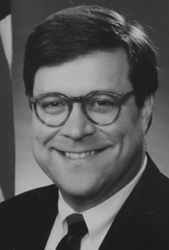 At Verizon, executive vice president and general counsel William “Bill” Barr hasn’t found life after Sarbanes-Oxley to be much changed. At Verizon, executive vice president and general counsel William “Bill” Barr hasn’t found life after Sarbanes-Oxley to be much changed.
“I’m fortunate because a company like ours—a large telephone company and having been heavily regulated—has a lot of internal controls and history of reporting to regulators. We also have a strong public-service ethic,” he says.
“Very little has changed, other than some processes are more formal, in terms of internal review sessions and meetings where we document what has been discussed. The internal audit people may spend a little more time to be sure they are touching all the legal aspects, but the company’s legal shop was always prominent, and employees are accustomed to making sure what they are doing is within the law.”
Perhaps Barr’s ability to take Sarbanes-Oxley in stride can also be attributed to his intriguing background. With a master’s degree in government and Chinese studies, Barr began his career with the Central Intelligence Agency as an analyst and assistant legislative counsel. While at that job, he enrolled at GW’s night law school.
“I went to law school as a lark and because my mother was harassing me about getting a profession under my belt that could give me flexibility in my career, rather than having a government job at the CIA and ending up in a blind alley. When I got to law school, I discovered I really enjoyed it. A couple of professors stand out—Max Pock, my contracts professor, and John Banzhaff, my torts professor. They stimulated my interest right off the bat and got me into the swing of things.”
The swing included clerking in the U.S. Court of Appeals in Washington, then alternating between Shaw, Pittman, Potts & Trowbridge; the Reagan White House; and the U.S. Department of Justice—as assistant attorney general, deputy attorney general, and in 1991, as U.S. attorney general.
In 1994, Barr joined GTE as executive vice president and GC. He was instrumental in the GTE-Bell Atlantic merger, which created Verizon in 2000.
“When a headhunter called me in 1994 about becoming the GC at GTE, I said I knew nothing about telephones or their technology, other than that they rang,” Barr laughs. “But GTE explicitly wanted someone who was not steeped in the industry. They wanted to bring a new face and a fresh perspective to the GC position. And they wanted their GC to not only have a broad range of legal skills but also to understand how Washington worked and be in charge of their regulatory advocacy work.”
Regulatory issues, more than Sarbanes-Oxley, are the main grist in Barr’s mill. When he joined GTE, the Telecommunications Act of 1996 was being formulated, some regulations were being swept away and technological advances were occurring in wireless, broadband, and Internet services. Today’s arena continues to present challenges.
“I address a great mix of things; it’s an intellectual feast for me. But most of my time is spent on regulatory issues, such as FCC rules and state regulatory issues. We have two layers of regulation to deal with, federal and state,” Barr begins.
“Our biggest challenge is to work with regulators to get a level playing field in the telecommunications marketplace. Under the Telecom Act, companies were encouraged to enter the marketplace and compete against us. As regulators opened the marketplace and eliminated old rules, our company ended up being half-regulated and half-nonregulated, while some of our competitors are totally unregulated. Another complication that regulators didn’t anticipate: many technologies are converging, like cable with phone, voice over the Internet—and virtually all those technologies are not regulated.
“Another main challenge is to get clear federal rules for broadband into place and be treated as other broadband companies are, such as cable companies.”
Verizon’s 150-lawyer legal department allows Barr to apply his talents to best use.
“I think that a good leader determines which projects are the most important and then concentrates his energy on those projects, rather than getting his energy dissipated by trying to address all the little things that come along,” he says.
“If you try to do it all, you progress one mile a day, instead of making 10 miles a day on the big things. Don’t let your inbox control you. Make sure the organization doesn’t run you, but that you run the organization.”
When Barr’s not running his organization, listen for the unique tones of a bagpipe. “I enjoy bagpiping. As a child, I loved the sound of bagpipes and started taking lessons when I was eight years old from a very accomplished Scottish player.
“As to my Chinese studies, I tell people that was probably the best preparation for being a telecommunications lawyer, because reading the FCC rules from right to left makes more sense than when you read them from left to right.”
Charles A. James Jr., JD ’79
ChevronTexaco
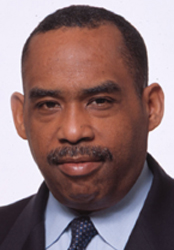 Charles A. James, vice president and GC, sees a few ripples but no big splash occasioned by Sarbanes-Oxley at ChevronTexaco. The bigger picture is another matter. Charles A. James, vice president and GC, sees a few ripples but no big splash occasioned by Sarbanes-Oxley at ChevronTexaco. The bigger picture is another matter.
“I wasn’t a GC in the pre-Sarbanes-Oxley world, but my take on the situation is the following: The events of the last couple of years have brought a new focus on corporate governance and responsibility. For some companies, this required some major changes. Fortunately, I work for a company for which the situation has not caused major changes. Some necessary procedures had to be formalized and we’ve done that,” James begins.
“I can also tell you that when I came for my first interview with ChevronTexaco, the very first thing someone handed me was ‘The ChevronTexaco Way’ document, which states how we choose to do business. It makes it easier for me to be part of a company that recognizes that getting things done the right way is part of the corporate way.
“About the post-Enron world, I see three consequences. First is a higher level of scrutiny on senior corporate positions, and that’s good. People need to understand the fiduciary standards and that they will be held to a high standard of ethics.
“Second are the legal reforms that have occurred as a result of Sarbanes-Oxley. A lot of these reforms are in a great deal of flux and I hope that, over a period of time, the situation will reach the right balance.
“The third consequence relates to the larger public-policy issue. I would hope the focus on post-Enron and Sarbanes-Oxley issues doesn’t detract from the focus we need in other areas, such as regulatory reform and civil justice reform. I hope that, over time, as much attention gets paid to that as is now being paid to assuring companies are acting responsibly.”
If you ask James how he got from GW to being GC at ChevronTexaco, a chuckle sounds. “I wish I knew. It’s still somewhat of a big mystery to me. When I left GW in 1979, I wasn’t sure I’d end up in the law, but then I was blessed by having wonderful jobs in the legal profession.”
His first job was at the Federal Trade Commission, where he eventually became assistant to the Bureau of Competition’s director. From 1985 until 2002, he alternated jobs between Jones, Day, Reavis & Pogue in Washington and the U.S. Department of Justice. At the Justice Department, he was deputy assistant attorney general and acting assistant attorney general in the first Bush Administration and then assistant attorney general, heading the Antitrust Division in the current administration. In late 2002, he began his current job.
James’ days are divided into different proportions of the many responsibilities of a general counsel at a company having business worldwide. As a member of the company’s overall business team, he sits on the corporation’s executive committee, which endorses all major funding and expenditures. He also attends to major legal projects and litigation.
“And there is the management portion. I’m interested not only in the practice of law, but how the practice of law is managed. An issue a GC faces that a private practice doesn’t is capacity building. It’s not only how you can execute legal projects, but also how you can create an organizational framework to achieve that,” he says. “My greatest teacher was Bill Barr, when we worked together at the Department of Justice. We are transforming our legal department and a huge portion of my day is used to achieve this organizational-capacity building.”
James sees three main functions for GCs in today’s public corporations. The first is to be the chief compliance officer, bringing legal standards to the corporation and assuring they are followed. The second is the ability to translate business imperatives into sound legal advice. And the third is to be an effective manager of risk, particularly in the litigation context, where people may be litigating against the company for large sums of money or to establish important principles.
Musing on his GW experience, he says, “One of the real benefits is that GW actually encouraged its students to work part time at law firms, and the school was also well tied into the local law community. Doing that gave me the appetite for practicing law, as opposed to being a guy who just had a law degree.”
When James is not working, he enjoys bodybuilding, rap music, driving his Porsche, and, most of all, spending time with his daughter. “I’m a single dad and, believe it or not, time spent with my teenage daughter is relaxing.”
Martha Brown Wyrsch, JD ’86
Duke Energy Corp.
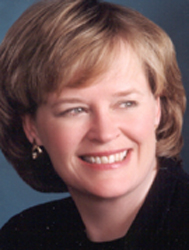 As Martha Brown Wyrsch begins her job as Duke Energy Corp.’s group vice president, general counsel, secretary, and executive committee member, she feels her company is well prepared to proceed in a post-Enron world. As Martha Brown Wyrsch begins her job as Duke Energy Corp.’s group vice president, general counsel, secretary, and executive committee member, she feels her company is well prepared to proceed in a post-Enron world.
“Working in a Sarbanes-Oxley world is very different and yet very much the same. Duke Energy always had a strong compliance structure and ethical foundation. We didn’t have to create a whole new system, but we enhanced them under Sarbanes-Oxley. We put a disclosure committee in place and developed a more robust CEO and CFO financial certification process.”
“I feel the intent of Sarbanes-Oxley is right and is going to lead to a more stable marketplace. Companies like Duke need to be transparent about our business in all aspects,” she adds.
Wyrsch brings to the GC position legal, business, and Capitol Hill experience. She gleaned the latter by serving three years as a staff member for Sen. Alan K. Simpson (R-Wyo.) before entering law school in 1983. After graduation, she cut her legal teeth at Davis, Graham & Stubbs in Denver from 1986 until 1991. Then one of the firm’s clients, KN Energy, hired her, and she was named its vice president, general counsel, and secretary in 1997. She also served on the company’s executive management committee.
When KN Energy merged to become Kinder Morgan in 1999, Duke Energy offered Wyrsch a job as senior vice president, general counsel, and secretary for Duke Energy Field Services. Five years, a stint through the Harvard advanced management program, and several positions later, her talents earned her a promotion in January to her current job.
She attributes her promotion to her substantial knowledge in the power industry and to her GC experience at KN Energy. It all helps her manage issues that are perhaps more challenging than Sarbanes-Oxley: working for a diversified energy company that must comply with a patchwork of regulations.
“Duke has three legs: We have a power utility in the Carolinas that is regulated; we have merchant power facilities throughout the United States and Latin America that are lightly regulated—but each state and country has different regulations, and we have an interstate gas-distribution network that transports natural gas from Canada and the Gulf of Mexico,” Wyrsch explains.
The stickiest area is the merchant power market. When the Federal Energy Regulatory Commission established rules to open the power transmission grid, not all states adopted similar rules, so a mismatch occurred between what FERC and individual states allow.
“We always have a variety of issues and challenges, and I think it is very critical for GCs to have a strong grounding in how their company’s industry works and how the company makes money,” Wyrsch says.
“I also think GCs need to be leaders of the business and keepers of the flame. We need to ensure on an ongoing basis that the folks in our organization are focused on doing the right things on ethics and values and running the business in a way that reflects those values.
“I also put a lot of emphasis here in ensuring diversity and the real value of inclusiveness. Diversity is more than a mix of race and gender; it is how you work with people, communicate with them, respect them, and make sure people feel safe and welcome to share their views. You need to not only bring people with different backgrounds to the table, but you also need to build on that to assure the right communication and conversation is there.
“At Duke, we also advocate community service, working with United Way and other agencies. Every year, we celebrate global service month, where we encourage employees to take time from work to do community service. For instance, members of the law department put together Easter Baskets for the local department of social services to distribute to families in need.”
Wyrsch also serves on GW Law’s Board of Advisors. Looking at her GW days, she says, “I took advantage of the many things GW offered, like an SEC internship. But it was Joel Seligman who really turned me on to business law and securities law. I took as many classes as I could with him.”
When she’s not working, Wyrsch enjoys skiing and bike riding with her son, daughter, and husband. “It may not be terribly exciting, but I enjoy our bike rides, being with my family, and knowing where my kids’ heads are.”
Back to top | Summer 2004 Table of Contents
|